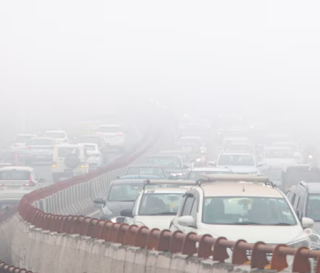As Delhi grapples with worsening air quality, the Commission for Air Quality Management (CAQM) has reintroduced stringent restrictions under the Graded Action Response Plan (GRAP) Stage III to combat pollution. This decision follows a rapid spike in pollution levels, with the Air Quality Index (AQI) crossing the critical 350 threshold and registering at 371 on Friday. Contributing factors include dense fog, low mixing height, and variable wind patterns, which have collectively exacerbated the capital's air pollution crisis.
GRAP Stage III Measures:
To address the severe air quality, GRAP Stage III imposes the following restrictions:
-
Construction and Demolition Ban:Non-essential activities, excluding critical projects such as hospitals, railways, and metros, are prohibited to control dust emissions that significantly contribute to particulate matter (PM2.5 and PM10).
-
Industrial Shutdowns:Industries and brick kilns using non-clean fuels are required to cease operations to limit emissions.
-
Diesel Generator Restrictions:The use of diesel generators for non-essential purposes is banned to reduce particulate pollution.
-
Vehicular Restrictions:Diesel trucks carrying non-essential goods are barred from entering Delhi, while stricter checks on vehicular emissions are enforced.
-
Dust Control Measures:Intensified mechanical road sweeping and water sprinkling are implemented to manage road dust.
-
Prohibition of Open Burning:Incidents of garbage and biomass burning are actively monitored and penalized to curb their contribution to air pollution.
Citizen Involvement and Monitoring:
Authorities urge citizens to comply with GRAP Stage III guidelines, emphasizing the importance of public participation in mitigating pollution. A dedicated citizen charter provides actionable recommendations to support the collective effort. The CAQM continues to monitor the situation and is prepared to escalate measures if AQI levels worsen further.
Context and Recent Developments:
These measures come just a week after GRAP Stage III restrictions were previously lifted, following improved air quality due to widespread rainfall. However, the sudden deterioration necessitated their reimplementation. The GRAP framework, tailored to address Delhi's recurring winter pollution, categorizes air quality into four stages, with Stage III addressing AQI levels between 401-450 and Stage IV for AQI above 450. The framework’s dynamic nature allows authorities to respond promptly to changing air quality scenarios.
Broader Implications:
Delhi’s persistent struggle with air pollution underscores the need for long-term solutions alongside temporary curbs. While measures like banning construction and vehicular restrictions address immediate concerns, systemic changes—such as transitioning to cleaner fuels, expanding public transport, and improving waste management practices—are essential for sustainable improvement in air quality.
The effectiveness of GRAP Stage III relies on strict enforcement by agencies across Delhi-NCR and the cooperation of its citizens. As the sub-committee on GRAP continues its assessments, additional interventions may be introduced to prevent further degradation of the region’s air quality.



